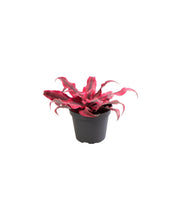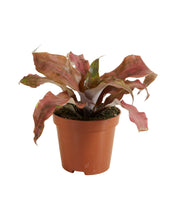Cryptanthus, often referred to as earth stars, are a fascinating genus of terrestrial bromeliads highly valued for their vibrant and intricate foliage patterns. These plants form flattened, star-shaped rosettes of stiff, often wavy-edged leaves, which come in an astonishing array of colours including shades of green, red, pink, bronze, and cream, frequently variegated or banded. Their unique textures and bold appearance make them popular choices for terrariums, dish gardens, or as small potted plants in UK homes. They are members of the Bromeliaceae family.
The genus name Cryptanthus comes from the Greek words kryptos (hidden) and anthos (flower), referring to the inconspicuous flowers that are often nestled within the leaf rosette.
Light: Cryptanthus generally thrive in bright, indirect light. Strong, direct sunlight can scorch the leaves, while insufficient light may cause their vibrant colours to fade, resulting in a greener appearance. A spot near a bright window with filtered light in a UK home is ideal.
Water: Keep the potting mix consistently moist but not saturated. Allow the very top layer of the soil to dry slightly between waterings. Unlike many other bromeliads, Cryptanthus species typically do not form a central "cup" to hold water, so watering the soil directly is crucial. Ensure excellent drainage to prevent root issues, which can be a common problem in the UK's climate.
Soil: A well-draining, airy potting mix is essential. A specialist bromeliad mix, or a blend of general potting compost with ample perlite or orchid bark, will provide the necessary drainage.
Fertilising: Cryptanthus are not heavy feeders. A very diluted liquid fertiliser, formulated for bromeliads or houseplants, can be applied monthly during the active growing season (spring and summer). Apply it to the soil. Reduce or stop fertilising during the autumn and winter months.
Temperature: These plants prefer warm temperatures, ideally between 18°C and 27°C (65°F and 80°F). They are not frost-tolerant and must be protected from cold drafts and temperatures below 15°C (59°F), which can occur in UK homes during colder months.
Humidity: Cryptanthus appreciate moderate to high humidity levels. While they can adapt to average indoor humidity in the UK, using a humidifier or grouping them with other plants can be beneficial, especially during drier indoor periods with central heating.
Growth Habit: They typically exhibit a low-growing, star-shaped rosette growth habit, spreading outwards rather than upwards. They generally remain compact, making them suitable for smaller spaces.
Toxicity: Cryptanthus species are generally considered non-toxic to humans and pets. However, it is always a good practice to prevent ingestion.



